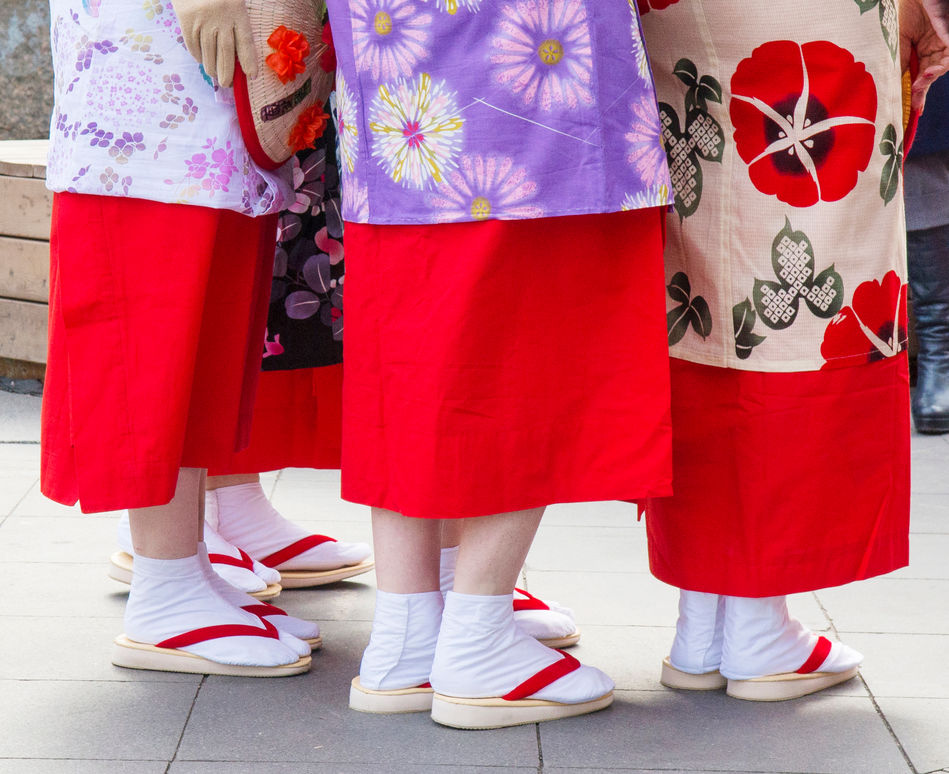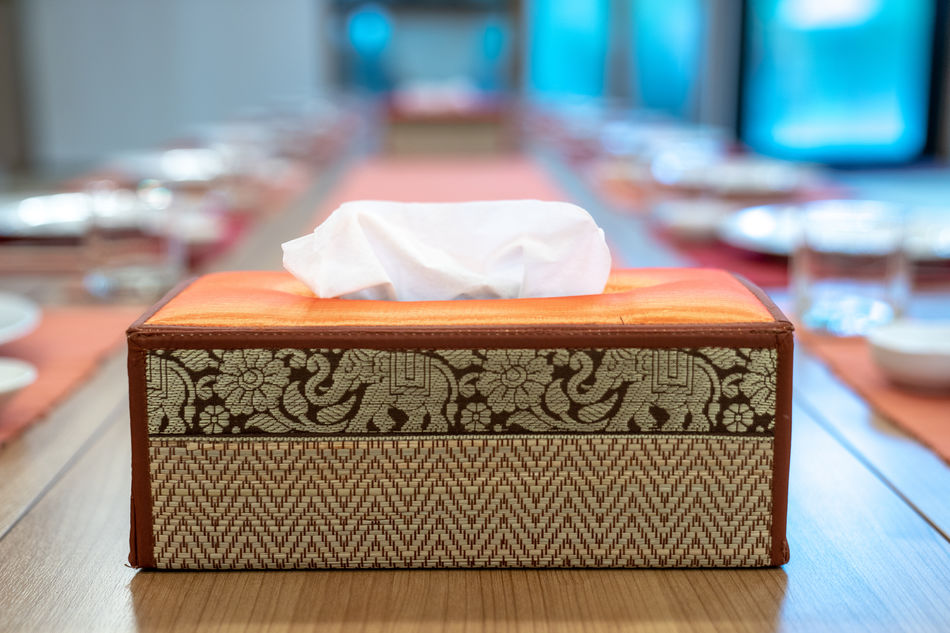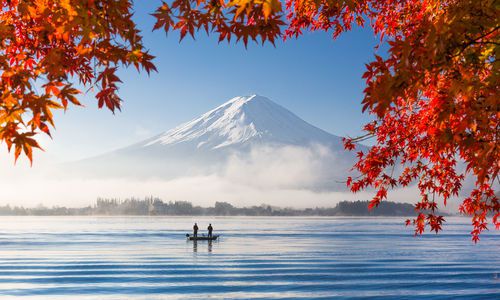Article content
10 September 2019 by Rachel Mostyn
From how to conduct yourself in a hot spring to why it’s rude to tip, consider this your introduction to the intricacies of Japanese manners. Don’t let it put you off, however. Although every effort to engage with the local culture will be measurably appreciated, any slips will be met with that famous Japanese politeness. As H. Jackson Brown Jr. opined in his bestselling Life’s Little Instruction Book – “Good manners sometimes means simply putting up with other people’s bad manners”.
1. Take off your shoes
One of the many ways that Japan keeps its immaculate image squeaky clean is by requiring guests to remove their shoes indoors. This can extend everywhere from temples and onsen baths to private homes and traditional stores. In fact, this is possibly the only rule that you will be explicitly reminded of, albeit oh-so politely. The trick is to follow what others are doing, keeping an eye out for shoe racks, disposable carrier bags and the all-important change in level between an entranceway and a room. Don’t worry, slippers are provided in the toilet. Just remember to take them off again.

Traditional geta sandals
2. Know how to onsen
A visit to a natural hot-spring bath is a crucial part of any trip to Japan. It’s the chance to unwind and engage with a time-honoured tradition, often to a gorgeous backdrop such as a traditional inn or a mountain setting. Thankfully, although it’s an ancient practice, the rules are pretty self-explanatory. You shower before you bathe, making sure to rinse yourself thoroughly so as not to get suds in the bath water, then you’ll leave the large towel in the changing room to dry yourself, bringing the smaller one for washing in the bath. If you have long hair, you should also remember to tie it up to minimise the chance of leaving any in the water!
Crucially, you’ll be bathing nude. Don’t worry, ever perfectly respectful, your fellow bathers won’t bat an eyelid. However, for those that really want to, private rooms are often available in ryokan inns; many luxury lodges even come with en suites. Those with tattoos might also want to follow suit. Though smaller ones can be covered up with a sticking plaster or bandage, they’re still associated with the infamous Yakuza syndicate and banned at many public onsen.

Private onsen in Myoshi
3. Bowing
Bowing in Japan can be used for everything from apologies and respect to ceremonies and martial arts sessions. Both the depth and duration are directly proportional to the level of feeling and formality expressed, with unwritten rules on reciprocation and frequency based on both parties’ social standing. Thankfully, visitors will seldom be required to bow, with handshakes preferred for international visitors. However, if the occasion does arise, simply do as the other party does. And, if you’re greeted in a shop, a small nod and dip of the head goes a long way.

Bowing in a traditional kimono
4. Don’t blow your nose in public
While in the west it’s usually considered rude to keep sniffing, in Japan the opposite is true; blowing your nose in public is frowned upon. And, it’s especially rude to do it at the table! So, remember that discretion is the golden rule and dip out.

Don't forget a tissue
5. Eating and drinking
When it comes to dining out, there are plenty of etiquette intricacies. Mercifully, most are so minute that they don’t even register, but there are a few that you should take heed of. Perhaps the most famous is that noisily slurping noodles isn’t just not considered rude, but it’s actively encouraged as a demonstration of your appreciation. However, in terms of “don’ts”, pouring soy sauce on rice and eating or drinking while walking are both frowned upon. You should also refrain from filling up your own drinks glass, instead making sure that the glasses of your companions are full and they’ll reciprocate.
Then, when it comes to chopsticks, there are a few things to bear in mind – as if they weren’t slippery enough. Don’t rub them together, don’t use them to pass food to another person and absolutely don’t stand them up in a bowl of food. It’s bad luck and recalls a Japanese funeral tradition. Lastly, when serving yourself from a communal plate, you’ll usually have a shared utensil to use. If there’s not, it’s considered good manners to use the fat ends of your chopsticks – the end that hasn’t been in your mouth.

A steaming bowl of ramen
6. Tipping
While you’ll undoubtedly receive some of the best service in the world in Japan, tipping is not just uncustomary, but it’s often considered rude, insinuating that your host doesn’t earn a fair wage. So, if you leave a tip, you can expect your waiter to chase after you with your “forgotten” change.

Taxi rank at night in Kyoto
7. Timekeeping
In a country where formal apologies are offered for slightly delayed trains, being fashionably late is simply not in the Japanese cultural vocabulary. No more is this true than in traditional ryokan inns. Here, guests are treated to fantastic kaiseki breakfast and dinners, where great effort is put into ensuring that each course is impeccably timed and impeccably fresh. Although they’ll never tell you directly, it’s insulting to your host if you skip your meal or arrive late.

A traditional kaiseki meal
8. Beckoning
The traditional western beckoning gesture is considered an insult in Japan, said to represent a dog or other animal. Instead, the signal is reversed, with the palm facing downwards and the arm stretched out away from the body.
Video guide to Japanese hand gestures, including beckoning
9. Business cards
Whether it’s a guide or at a hotel, there might come a time that you’ll receive a business card on your visit to Japan, even as a tourist. While the setting is likely to be less formal, you should remember to treat any proffered card with the utmost respect. Receive it with two hands and a bow, making a point to carefully study it before placing it in front of you on the table or carefully stowing it in a safe place.

Swapping business cards in Japan
10. Paying
Whether at a convenience store or a restaurant, you shouldn’t hand your cash directly to your server. Instead, make use of the small tray by the cash register. Remember, restaurant bills are usually settled at the front desk.

Japanese money tray
Inspired? Take a look at our Japan itineraries below, or get in contact to start planning your trip:




